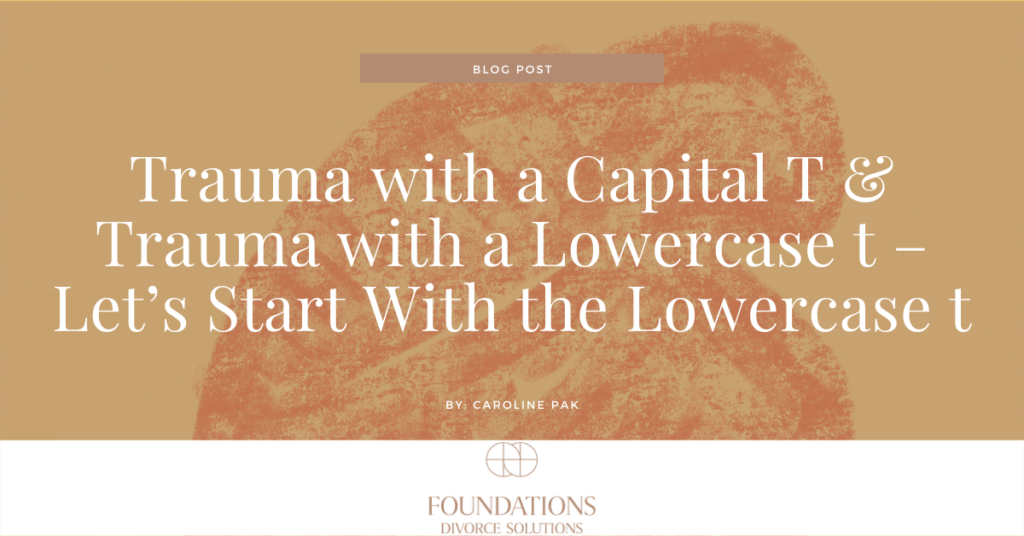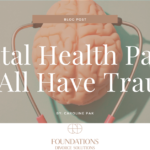This week on Build Your Foundations, we will continue our Mental Health Pause. Last week, it was mentioned that everyone has experienced some type of trauma. Most of our trauma is considered trauma with a lower-case t. Some of us have experienced trauma with a Capital T. This week, we will focus on trauma with a lowercase t and the significance of taking our own personal mental health pause.
First, let’s establish what trauma is and what may be considered Capital T traumas versus what is considered lower case t trauma. Trauma is generally understood as an event in our lives that causes distress outside of our normal day-to-day experience, an event to which we give significance and outside of our ability to cope. Our emotions may feel overwhelmed and we may even block these memories out as a self-protective coping mechanism. There are many examples of trauma. Experiencing sexual assault, molestation, domestic violence or murder may be categorized as Capital T trauma. Many of us, thankfully have not experienced these traumas and along with it the psychological effects as a result such as PTSD. Many of us instead have experienced a myriad of lower-case t traumas, which may be causing anxiety or depression as a result of not taking a pause to sit with, acknowledge and work through the trauma.
For me personally, a couple of the traumas, which were shared last week was the death of my aunt coupled with a relationship breakup within days of one another. Although the death of my aunt was significant, I personally consider her death and the breakup a lower-lowercase t trauma.
MY PERSONAL TRAUMAS – Lowercase t
Today, I will share with you a couple of other little t traumas which I have experienced and have impacted my life from childhood into adulthood.
Part of my personal trauma story happened when I was a little over 6 years old. My dad, mom, my younger brother, and I immigrated to the United States from South Korea. My parents decided to come to the States in search of a better life, a possibility for a greater future, the idealized American Life. What they did not realize was the trauma we as immigrants endured to start this new life.
As a six-year-old in Korea, I had started first grade, and even to this day, I have fond memories of my time in Korea. I remember my old classroom at the elementary school. In one specific memory, I remember sitting in class, playing with some new pencils and erasers, which my uncle gave me as a gift. As I was playing with them, the eraser fell off my desk and into a crack between the wall and the floor, and that my fingers were too big to try and get the eraser out. I also remember my mom or grandmother walking with me to and from school.
I even remember our last day in Korea, the day we immigrated. My next-door neighbor came over for a visit and we were watching cartoons together until my parents told me I had to say goodbye and we would be going to the airport to go to America. I even remember parts of the plane ride. My family had a row of seats towards the back of the plane, next to the window and I remember my parents and my brother sleeping while I peeked out the window and saw clouds in the sky which I thought looked like angels.
When we landed in Los Angeles, we went to my dad’s sister’s home. She and her husband graciously invited our family into their home to stay with them until we found a place of our own. This was the aunt who, I mentioned earlier, passed after being struck by a van.
My aunt’s house was different from our home in Korea. It was huge and there were two stories with all the bedrooms upstairs and shared living space downstairs. Our house in Korea was a combination of indoor and outdoor living combined. All the bedrooms were connected by a small outdoor courtyard and not by hallways. Even the bathroom was connected to the courtyard. You see, in Korea, my parents, brother, and I shared one room to sleep. We used this room as our living room, family room, and bedroom. We, as a family unit, spent all our time together in this room.
My life as a six-year-old was turned upside down when my family immigrated to the States and moved to a place where I neither understood the language nor the customs. I was now sharing a room with my cousin instead of with my parents and brother. My aunt had two daughters, one who is a year older than I, and we shared a bed in her room. I don’t believe my parents, nor my aunt and uncle meant any harm to my cousin or myself because it made complete logical sense to put two little girl cousins to share a room but having to share a room with my cousin meant I was now separated from my mom, my dad and even my little brother without any explanation or even preparation.
These two events in my life, my immigration story, and being separated from my family right after immigrating to the States and now sharing a bedroom with my cousin had made a significant impact on me. I had experienced these two traumas which I was not able to cope with, voice, or understand due to being so young and over the years, I had forgotten about this time in my life.
THE SIGNIFICANCE OF TAKING A MENTAL HEALTH PAUSE
So why do I share my personal stories and why are we taking a mental health pause and encouraging you to also take a mental health pause with us? Last week, I mentioned that I realized I was stuck in some patterns when the two separate traumas of my aunt’s death and the other of the end of a romantic relationship, occurred at the same time. When I started my therapy journey, I had no idea that these double traumas would lead me to the realization of my past double traumas of my immigration story and the separation from my family when I shared a room with my cousin. Even as I ponder how all four of these traumas are intertwined and how significant of an impact they have had on my life as a child and as an adult, it causes me to pause and ponder. Giving breath to these stories reminds me how my aunt who passed is the same aunt who invited our family into her home at a time of significant change in our family’s lives and the same aunt who was there as I experienced what seemed like a small but a significant separation from my family. Both traumas, from childhood to adult life are about the death of one life as we know it and the separation and shifting of relationships, and how we cope through these traumas.
My experiences as a six-year-old had created patterns in my life, which I did not realize was having a significant and at times negative impact on my life and how I related to people. The double trauma I experienced as a 44-year-old has caused me to dig deep and remember the story of a little girl who also experienced double trauma and was not given a voice to share the overwhelm and to have help in coping with the changes she was experiencing but now gets a chance to be acknowledged and to heal.
In the Bible, it says that we are fearfully and wonderfully made. Even in writing this and reflecting, I am reminded that we are truly fearfully and wonderfully created. The generosity and grace my aunt imparted to our family in our immigration were enormous. To invite an entire family to take up your home and to have free reign is above and beyond and I now I am recognizing that when I was unable to stop the tears 3 April’s ago, it was not just due to a break up of a relationship but the loss of a family member who had such an enormous impact on my childhood. How after almost 40 years, my body and mind chose these two traumas to allow two past traumas to be revealed and worked on is incredible.
My trauma story is unique to me but everyone has a story unique to only you. And you are the only one who can create a space to pause and sit and reflect and heal. We are the only ones who can give oxygen to our stories and work towards the healing, even to healing you are not yet aware of yet. The year of weekly therapy was not easy but it was so needful. I know that the woman who started therapy is not the same woman I am today. The gift of being able to work through some of the trauma in my life has been freeing to my mind, soul, and even my physical body. I hope that my story will encourage you to pause and reflect and even take the very brave steps towards healing.
At Build Your Foundations, we want to continue to support you as best as we can if you choose to take steps toward healing mentally, physically, and even spiritually. Please reach out to us if we may be able to provide any guidance or referrals. Next week, trauma with a Capital T.




